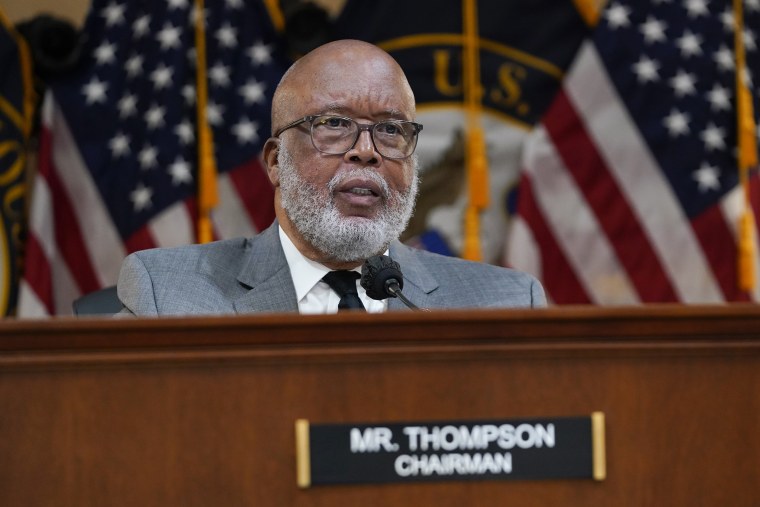The chair of the House committee investigating the Capitol riot said Monday night that the panel will not make any criminal referrals, even though its leaders have previously hinted at the possibility of doing so.
"Our job is to look at the facts and circumstances around January 6 — what caused it — and make recommendations after that," Chair Bennie Thompson, D-Miss., told reporters as he left the House chamber after the second day of public hearings by the panel.
When pressed on the matter and whether the committee had ruled out the possibility of referring criminal charges, particularly for former President Donald Trump, Thompson replied: "We don’t have authority."
But the committee's vice chair Liz Cheney, R-Wyo., suggested later on Monday that a decision was not yet final.
"The committee has not issued a conclusion regarding potential criminal referrals. We will announce a decision on that at an appropriate time," she said in a statement on Twitter.
Rep. Elaine Luria, D-Va., tweeted in a separate statement, that the committee "has yet to vote," on recommending criminal referrals.
"If criminal activity occurred, it is our responsibility to report that activity to the DOJ," she said.
Rep. Adam Schiff, one of three California Democrats on the committee, also weighed in during a CNN interview Monday when asked about Thompson's remarks, saying, “We haven't had a discussion about that, so I don’t know that the committee has reached a position on whether we make a referral or what the referrals might be, I thought we were deferring that decision until we concluded our investigation.”
While Democrats have hoped the congressional hearings would lead to criminal prosecutions, making a criminal referral — instead of simply inspiring the Justice Department to act — comes with the risk of making the committee's entire investigation appear political.
Thompson's remarks on Monday contrast with earlier suggestions that criminal referrals might be on the table.
In an article published this year, Thompson told NBC News that the evidence gathered in 2021 pointed to Congress formally asking the Justice Department to use its work as the basis for prosecutions.
“The potential for criminal referrals is there,” he said.
More recently, in April, the committee's vice chair Rep. Liz Cheney, R-Wyo., said the panel had sufficient evidence to refer Trump for criminal charges, but cautioned that the panel had not made a decision about moving forward with it.
“It’s absolutely clear that what President Trump was doing — what a number of people around him were doing — that they knew it was unlawful. They did it anyway,” Cheney said during a CNN interview at the time, when asked her whether the committee had enough evidence for a criminal referral.
The committee has previously advanced measures to refer former Trump aides to the Justice Department for contempt of Congress charges over refusal to comply with subpoenas. Those referrals required a House vote before they could be sent to the Justice Department.
Thompson said the committee demonstrated through pre-recorded video interviews how key figures in Trump’s orbit had told him he lost the election “early on, but that he had continued to promote the stolen election lie to their fundraising apparatus.
Supporters were urged to donate to Trump’s “election defense fund” but the committee said it found no such committee or fund existed. Instead, much of the $250 million raised went to Trump’s new super PAC, called the Save America PAC, launched just the days after the election.
Thompson's comments put more pressure on Attorney General Merrick Garland, who might find himself facing the politically fraught decision of whether to pursue a criminal case against Trump. So far, there is nothing to suggest Trump has become a criminal target.
